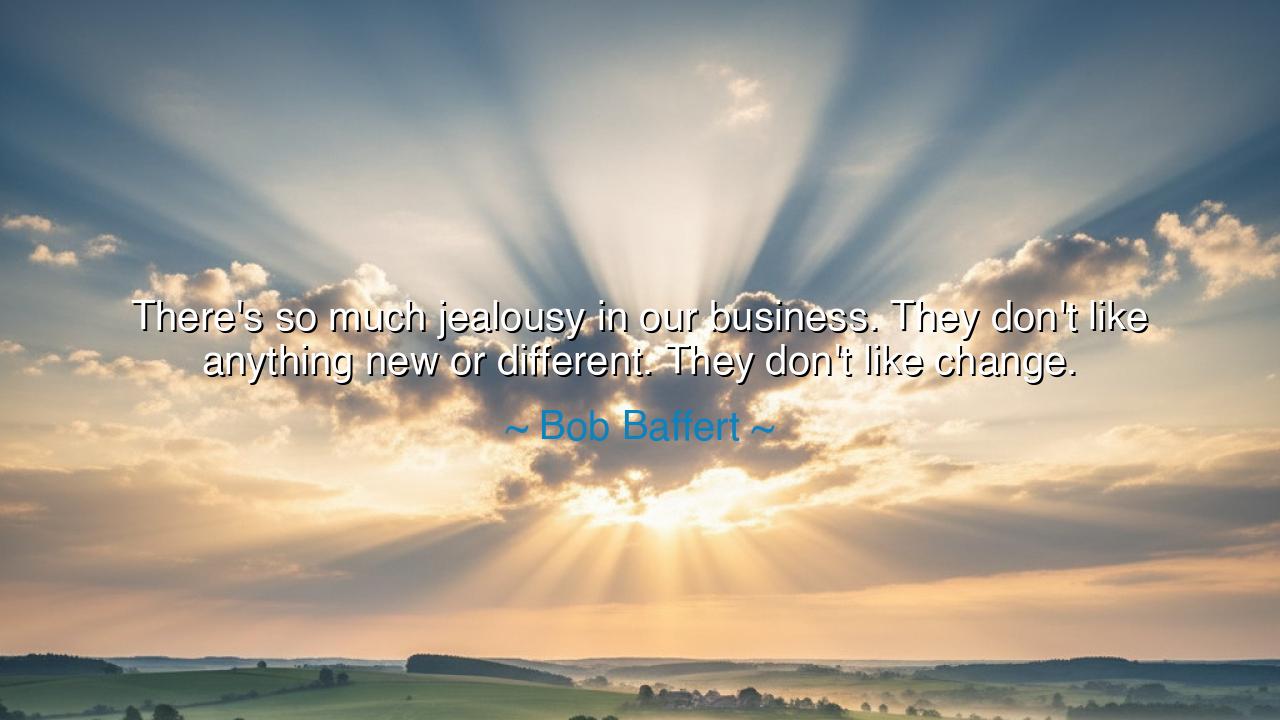
There's so much jealousy in our business. They don't like
There's so much jealousy in our business. They don't like anything new or different. They don't like change.






“There’s so much jealousy in our business. They don’t like anything new or different. They don’t like change.” Thus spoke Bob Baffert, the famed horse trainer whose career has been marked by triumph and controversy, by the glory of champions and the shadows of rivalry. Though uttered in the context of racing, his words echo a truth that transcends his world and belongs to all of humanity: that wherever greatness arises, wherever something new or different dares to take root, there too will arise jealousy and resistance.
For men and women are creatures of habit, and the comfort of the familiar is to them a fortress. When someone steps forth with a new way, a bold vision, or an untried method, the timid and the envious see not opportunity, but threat. They cling to the past, fearing the dawn, and they call their fear tradition. But it is not tradition—it is the chain of stagnation. Change is the law of life, yet how many rage against it, preferring to sink in still waters rather than sail into the unknown sea?
Baffert’s words lay bare the hidden struggle: that in any field—be it business, art, politics, or sport—the fiercest battles are not always fought against nature or circumstance, but against the resistance of others. The jealous cannot endure to see another excel, for it reflects their own mediocrity back upon them. The fearful cannot tolerate the different, for it shakes the illusion that their way is the only way. And thus the innovator, the pioneer, the creator, must not only face the difficulty of their craft but the hostility of their peers.
History offers countless examples. Consider Galileo Galilei, who gazed upon the heavens and declared that the Earth moved around the sun. His discovery was not welcomed as light but condemned as heresy, for it was different and it demanded change. Jealous scholars, clinging to old teachings, attacked him not for lack of truth, but for daring to overturn the comfortable order. Yet time vindicated him, as it always vindicates those who stand with truth. His story teaches us that the path of the new is often lonely, and those who walk it must endure both envy and scorn.
So too in the world of art. When Vincent van Gogh painted in colors and strokes unseen before, he was mocked, dismissed, and rejected. The world did not like his different vision, and jealousy from lesser talents kept him in poverty and despair. Yet today, his work is celebrated as genius, and his name is written in letters of light. The lesson is clear: that the seeds of the future are often despised in the present, and the birth of change is always painful.
What, then, must we learn from Baffert’s words? First, that jealousy is a poison to the soul, and we must guard ourselves from it, lest it blind us to beauty and possibility. Second, that when we encounter something new or different, we must not reject it in fear, but examine it in humility, for it may hold the key to growth. Third, that if we ourselves are the ones called to bring change, we must walk with courage, knowing that resistance and envy will come, but so too will vindication if our work is true.
Therefore, let us cast away jealousy, that petty chain that binds the heart. Let us welcome change as the wind that carries us forward, even when it blows cold. And let us honor the different, for without them, the world would remain forever in the shadow of sameness. Remember Baffert’s words, not only as a lament of his own business, but as wisdom for all: “They don’t like anything new or different. They don’t like change.” Then rise above such pettiness, and live as one who embraces the new, who welcomes the different, and who walks boldly into the winds of change—for there, and only there, lies greatness.






AAdministratorAdministrator
Welcome, honored guests. Please leave a comment, we will respond soon